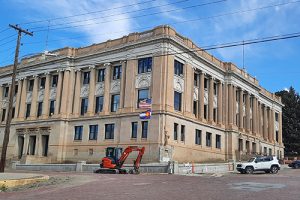by Nancy Christofferson
LA VETA — Come Sunday, be sure to raise your voices in a rousing round of Happy Birthday, because on Oct. 9, La Veta will celebrate her 135th anniversary as a town.
Colorado was granted statehood on Aug. 1, 1876, and many communities were jumping on the band wagon to become members, as it were, of the new great state. So it was that La Veta, at the time a busy frontier settlement full of railroad graders and all the riffraff that follows them, was anxious to be a real municipality. On Monday, Oct. 9, the county commissioners met and ordered the town incorporated and appointed five men as trustees of it. One John C. Swarts was appointed clerk and treasurer. The trustees were John M. Francisco, G.W. Morton, Joseph Baker, J.B. Brink and Samuel Todd. The latter two owned the two hotels in town, and Todd had just that year been one of those responsible for the founding of the platted city of Cucharas out east of Walsenburg. Since both Cucharas and La Veta were along the right of way of the growing Denver and Rio Grande Railroad, opportunities were rife for early birds.
The trustees wasted no time in meeting, and did so that very evening of incorporation. The Oct. 9, 1876 minutes begin, “Board of Trustees of the Town of La Veta met Pursuant to adjournment and was organized as follows – It was Moved by G.W. Morton and Seconded by Mr. Baker that Col. Francisco be made permanent chairman of the Board. Motion Carried…” The men were duly sworn into office by Justice of the Peace W.A. Toffelmire. And so La Veta was born.
Col. Francisco was the oldest citizen of the town in terms of length of residence, which is no doubt why he was elected chairman. In effect, he was mayor, but for some reason no one mentioned that word.
Before incorporation the settlement had been referred to as Francisco, or Francisco’s Ranch. It had been a designated polling place since 1866 (before that, a voter had to go to Badito, on the Huerfano River, to cast his ballot), and its post office named Spanish Peak was established June 15, 1871. With the approach of the D&RG tracks and the railroad’s guarantee to bring prosperity and commerce, the community was renamed La Veta, meaning the vein (of something), by D&RG’s town company subsidiary and a post office of that name came into being on Aug. 17, 1876.
La Veta spent a month in limbo before approving a set of ordinances Nov. 11, 1876. These came from the town of South Pueblo. Once the ordinances were in place, the board of trustees began issuing business licenses on Nov. 25. The town clerk must have been very busy that day, for 22 licenses were issued. All were good for three months and cost from 75¢ to $15.00. Naturally, it was the liquor licenses that cost the most, since the liquor purveyors had the corner on the market with all those graders hanging around. The 22 included eight saloons and one liquor dealer, four meat markets, a “dealer in canned fruit and groceries”, a pigeonhole table, two livery and sales barns, a transfer and express wagon business, two hotels and two restaurants. Interestingly, Town Clerk Swarts owned one of those saloons.
Once the license fees were paid, the new town had $152.25 in its treasury, and the trustees turned their attention to building a jail in which to house all those graders reeling out of all those saloons. The jail required $52.99 for lumber, $5.25 for locks, $55.00 for labor and $26.80 for iron work, for a grand total of $140.04. Unfortunately, the treasury was further depleted with the death of a prisoner who was a pauper, so the town had to buy a $4 coffin. And then the constable, James Disney, was told to buy “four pairs of blankets not to exceed $3.00 per pair”, and a half ton of coal. Perhaps the pauper had frozen to death, and those $4 coffins could set a town back pretty quickly so it was deemed prudent to keep the prisoners a little warmer.
Luckily, the clerk had sold another spate of business licenses in December (including seven more saloons and liquor dealers), so the town coffers had been replenished in case more coffins or blankets were needed.
Now the town fathers could concentrate on other business, such as hiring a new constable and then firing him for drunkenness, and telling the clerk to buy himself a desk (it was hand built, and not completed until March 1878). And those darn prisoners were still demanding all sorts of amenities and a pound of candles had to be purchased. Water and a bucket to put it in were bought. And the roof had to be repaired, but one prisoner still got sick and it cost $3 a day for his care! All this impertinence so irritated the trustees they “Moved and Seconded that if prisoners confined in the calaboose refuse to work out fines . . . the town Marshal be instructed to feed them on Bread and water untill they do.”
The first town election was April 3, 1877. One hundred and twenty-four ballots were cast to re-elect Francisco and Brink, trustees, and Swarts as clerk. Todd had quit in a huff when he presented a bill for $10.00 for his time attending town meetings, and it was not allowed. The new trustees were W.A. Moore, a general merchant, M.W. Brown and E.H. Belcher, the latter of whom had already depleted the coffers with a law suit which cost $5.00 in attorney fees. But then the board received a bill for $12.00 from the local doctor for treating prisoners and decided not to pay that, and gave Todd his ten bucks instead. Such were the decisions having to be made by elected officials of the day.
Then in August 1877, the D&RG had built its line across La Veta Pass and reached a new terminus, the town of Garland City in the San Luis Valley. The trains hauled out houses, store buildings, furnishings and everything else moveable and La Veta became a much quieter place. Old timers must have heaved sighs of relief at the departure of the rowdies. Most of the saloons moved on with the graders, as did part of the Town Board. Brown and Swarts left with the railroad, and W.A. Moore quit. Without the graders to incarcerate, town expenses went down, but then, so did the license fee sales. For instance, only three saloons remained (one belonging to Walsen and Levy of Walsenburg). By 1878 the only firms taking out licenses were five liquor stores or saloons, the hotels, a butcher shop, two general stores and a drugstore.
Town Board evidently had little business to transact, and even when it did, no one showed up to make a quorum. The winter of 1877-78 brought some type of epidemic, however, and bills came in for maintaining “the pest house” and for treating prisoners. After May 1878, no meetings were held until the following January.
Poor La Veta – only two years old and already abandoned. Somehow, of course, she revived herself and has managed to muddle through another 133 years to the present day. Happy birthday, old girl, may you live long and prosper.

Breaking news: Results of Walsenburg Mayor race and recall election
Gary M. Vezzani was elected Walsenburg’s mayor in Tuesday’s special mayoral election/recall vote. Preliminary results announced Tuesday night show that both Nick Vigil in Ward



